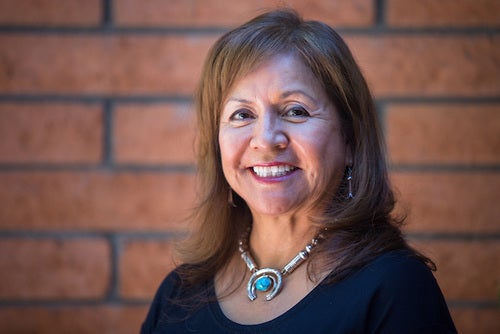Code Talker 101: ASU professor, storyteller offers insight on history

Once sworn to secrecy about their cryptic contributions to U.S. military battle, some former hidden heroes are now decoding the details of their efforts for historical posterity.
The last living members of the World War II Navajo Code Talkers are calling for the creation of a national museum to honor the memory of their elite band of brothers. It’s a recognition many, including Arizona State University Professor Laura ToheTohe is a professor in ASU's Department of English and the author of several books, songs and plays. In 2015, she was honored as the Navajo Nation Poet Laureate in celebration of her work as a poet and writer. , say is long overdue.
“Outside of the tribal community, Navajo Code Talkers are deeply admired,” said Tohe, whose father was himself a Code Talker. “People are curious about their contributions and how they used the Navajo language to save many lives.”
Under special classification by the military, Code Talkers were forbidden to talk about their covert service in the first and second world wars until the program was declassified in 1968. However, even after declassification, it still took years before the Code Talkers began to find their place among retold stories of American patriotism.
Tohe shed some light on that history in her 2012 book “Code Talker Stories,” which details the war experiences of these soldiers. And, with the recent honoring of a group of Code Talkers at a White House ceremony where the petition was made for a new museum, Tohe shared more background with ASU Now on the history that has elevated recognition for Code Talkers in recent years.
Laura Tohe
Question: Who are the Code Talkers?
Answer: The Code Talkers were Marines from several tribal nations who used their native languages to devise a military code during WWI and II. Among them are the Hopi, Comanche, Choctaw, Creek, Chippewa, Meskwaki and Lakota Code Talkers. The Navajo Code Talkers are the most well-known. They used the Navajo language to devise a secret code during WWII to send sensitive messages over the radio waves that was never deciphered by the Japanese. It was quick, accurate and saved many lives in the South Pacific where they fought in many battles.
Q: Describe the life of a Native American man during WWI and WWII. What would be the incentive or motivation to serve in those wars when they were not considered citizens of the United States during those years?
A: Life on the indigenous homelands were difficult. Based on my grandmother’s stories, disease was rampant in the schools on the Navajo reservation during part of WWI. She saw many of her classmates succumb to the disease in school. During this time, Native peoples still spoke their native languages and may have learned English in school, if they attended. Because of poverty, lack of economic sustainability on the homelands, continuance of warrior traditions, patriotism and an enduring belief in protecting America, indigenous men enlisted or were drafted.
I was surprised to find in my research for my oral history book that admiration for the military uniform also led some to enlist when the recruiters came to their schools. While indigenous peoples enlisted in the military in great numbers, and still do, they were not given citizenship until after they returned from military service. The Navajo Code Talkers did not have voting rights in Arizona until 1948, after WWII ended.
Q: How were Code Talkers received inside their tribal communities after their service?
A: Native people have always honored their warriors since before contact. A warrior’s role was to protect, guard and engage in battle with the enemy when it was needed. The Code Talkers took on these responsibilities that earned them all the recognition they receive for their bravery and courage. They returned home as honorable soldiers to their families who were happy and grateful to have them home. The Navajo Nation honors them every year during Navajo Code Talker Day in August and at tribal gatherings throughout the year. They are regarded as the heroes of the Navajo Nation.
Q: Thanks to books like your “Code Talker Stories” and movies like 2002's “Windtalkers,” we are finally getting a more in-depth look at the contributions of the Code Talkers. What other stories would you like to see told about Native Americans in relation to their contributions to American war efforts?
A: I would like to see a film made about the Code Talkers told from their perspective and not Hollywoodized. It should be told with a genuine and truthful sense, acted by Navajo characters and written by a Navajo screenwriter. I’d like to see this film with English subtitles and told with the Navajo sense of storytelling. This film should be made with cultural sensitivity and one that is Navajo-centered. I think this film would appeal to a tribal and mainstream audience.
Relaying tactical information in their native languages by radio and telegraph, Native American Code Talkers were on the front lines of battles in World War I and helped the U.S. to victory during World War II. They were awarded a Certificate of Recognition by President Ronald Reagan in 1982 and received a Congressional Gold Medal in 2001.


